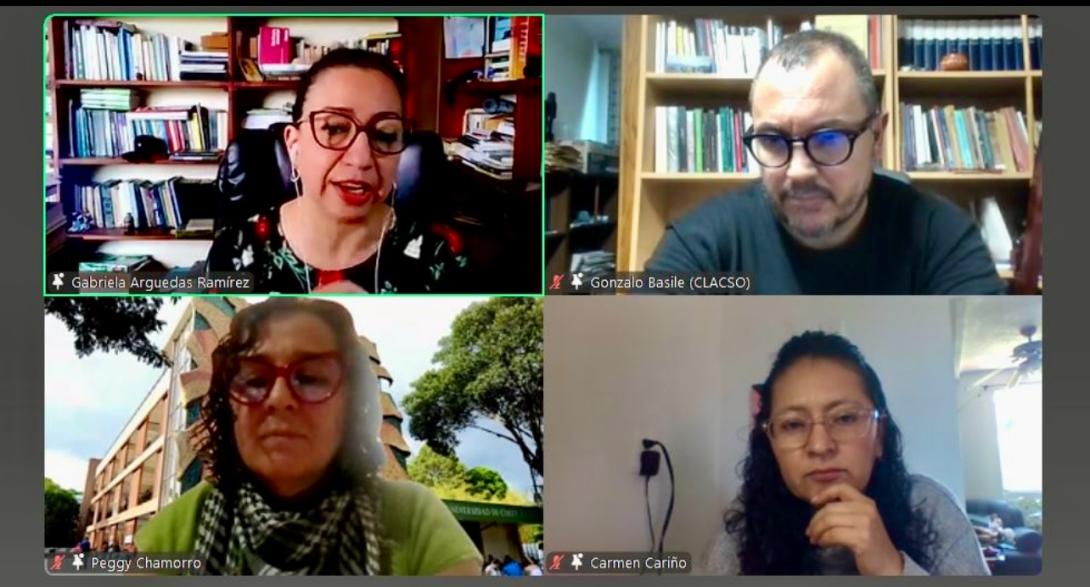
August 4th, 2025- Webinar Recap
“We were never in the same boat.” With these piercing words, Prof. Gabriela Arguedas-Ramírez, opened the 4th Bi-Monthly Webinar, co-organised by the Global Health Solidarity Project with CLACSO and the University of Costa Rica. Building on previous regional dialogues, including a Mesoamerican workshop held in Costa Rica in March, the session challenged dominant global health paradigms and exposed the power dynamics they often obscure.
Prof. Arguedas-Ramírez, the moderator, invited over 60 participants to reflect critically on solidarity through the lived experiences of Indigenous, rural, and feminist communities.
As democratic backsliding and humanitarian crises intensify across Mesoamerica, from constitutional erosion in El Salvador to weakened international health institutions, three distinguished speakers from the region challenged prevailing narratives and called for transformational change rooted in territory, care, and collective power.
Health as Land, Memory, and Resistance
Sociologist and territorial struggles expert Prof. Carmen Cariño Trujillo, redefined health not as a clinical endpoint, but as a political and spiritual act of survival. Her vision of health was grounded in sovereignty, agroecology, and ancestral healing, rejecting the extractive logics of Western public health. Her message was clear: you cannot talk about health without confronting the systems that dispossess communities.
“The same structures that take away our land are the ones that make us sick—and then deny us care.”
Drawing from Indigenous epistemologies, Cariño Trujillo illuminated the intimate connections between land, violence, and illness, calling attention to the silent epidemics brought by environmental degradation and megaprojects. She emphasised that ancestral medicine was not merely a back-up during the pandemic, but essential, life-saving knowledge.
“Health is not just the absence of illness—it is the presence of land, memory, dignity, and the collective will to resist destruction. That resistance is solidarity.”
Solidarity as Embodied Feminist Resistance
Peggy Chamorro, a gender researcher and feminist from Costa Rica, offered a stirring reflection on solidarity as lived, embodied resistance. She challenged neoliberalism’s erosion of human connection and identity, offering feminism as an intergenerational counterforce, one that turns personal pain into political power.
“Solidarity is not a slogan, it’s the hands that guide you in the dark, the voice that says you’re not alone, and the quiet rebellion that dares to protect life when the state turns its back.”
Chamorro’s storytelling was deeply personal: growing up in a poor coastal town, navigating teen pregnancy, and surviving through the silent care of feminist networks. Her message was defiant and loving.
“She made me a map. A route. She freed me.”
For Chamorro, solidarity is a politics of affection, practised in hidden spaces, driven by empathy, and anchored in the dignity of marginalised bodies, especially those criminalised or ignored by formal health systems.
Dismantling Global Health to Reclaim Sovereignty
Dr. Gonzalo Basile, an epidemiologist and critic of global health imperialism, called for nothing less than the dismantling of global health as we know it.
“We don’t see global health as a concept to be rescued… it must be dismantled.”
He traced its colonial origins, highlighting how global governance, security, and capital continue to shape it through militarised epidemic responses and philanthropic capitalism.
“They say they bring solutions, but they bring business models.”
True solidarity, he argued, does not mean inclusion in a broken system, but the creation of entirely new systems—grounded in regional sovereignty, critical Southern knowledge, and selective power.
“Solidarity isn’t about adding voices to a broken system — it’s about dismantling the structures that silence them, and building health from the South, on our own terms.”
Audience members added a rich layer of insight to the conversation. One participant challenged the narrow implementation of abortion law in Argentina, calling for a broader vision of care that includes mental health and planetary well-being. Another asked how to resist megaprojects.
Across disciplines, geographies, and lived experiences, the speakers converged on one message: solidarity is not a policy, it is a practice of courage, a reimagining of power, and a commitment to life in all its forms.
YouTube Link: https://www.youtube.com/watch?v=56FufYL8EHI
- Log in to post comments